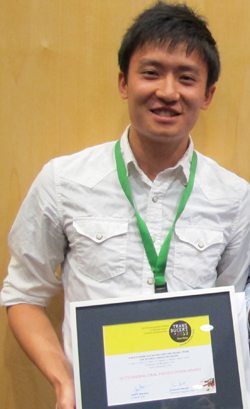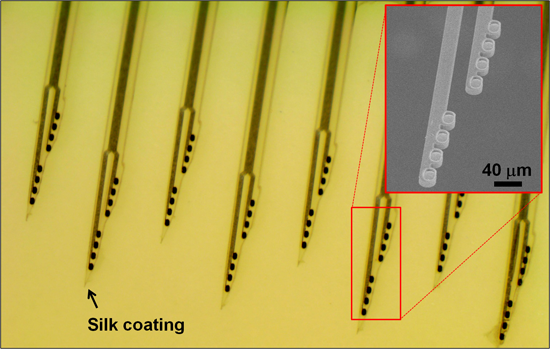Neural Probe Research recognized with Best Paper Award at 2013 Transducers Conference
“We present a novel strategy to scale up the number of electrodes with minimized risk.”

 Enlarge
Enlarge
Doctoral student Fan Wu received an Outstanding Oral Paper Award at the 17th International Conference on Solid-State Sensors, Actuators and Microsystems(Transducers ’13) for the paper entitled “A Multi-shank Silk-backed Parylene Neural Probe for Reliable Chronic Recording,” co-authored by Lee Tien, Fujun Chen, Prof. David Kaplan, Prof. Joshua Berke, and his advisor, Prof. Euisik Yoon. Tien and Kaplan are with the Department of Biomedical Engineering at Tufts University; Chen and Burke are with the Department of Psychology at the University of Michigan.
The researchers designed and obtained the first in vivorecording of a biodegradable silk-backed neural probe.
“Many chronic brain implants would benefit from a neural probe with many densely configured electrodes with stable recording quality,” stated Mr. Wu. “We present a novel strategy to scale up the number of electrodes with minimized risk of proportionally increasing the adverse foreign body reactions.”
“A flexible parylene probe having 64 electrodes has been designed and fabricated with unique geometries for reduced tissue reactions. Biocompatible silk fibroin was patterned to provide the required mechanical stiffness and sharpened tip for proper insertion of the parylene probe during implantation. The silk support degraded at a controlled rate after implantation was complete, leaving behind ultra-small and flexible electrodes for chronic recording.”

 Enlarge
Enlarge
“This technology will permit tremendous freedom in the design of any type of implantable medical devices in terms of material, size and shape. We implanted the fabricated probes in six adult Long Evans rats. Our recording results have provided the first in vivo validation of silk-coated neural probes with stable recording quality over a period of 6 weeks.”
The work is funded by the Microsystems Technology Office, DARPA, and the NSF Graduate Research Fellowship Program (the latter awarded to Fan Wu). Prof. Yoon is a Professor of Electrical Engineering and Computer Science and of Biomedical Engineering. He is Director of the Solid-State Electronics Laboratory and the Lurie Nanofabrication Facility.
 MENU
MENU 
